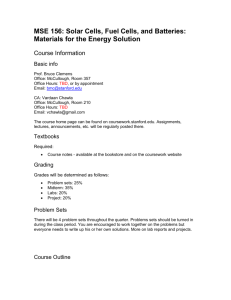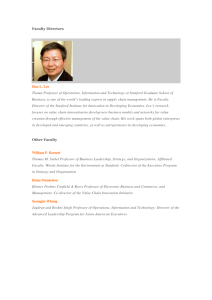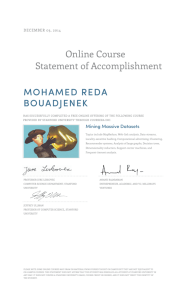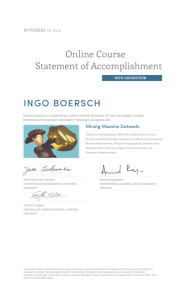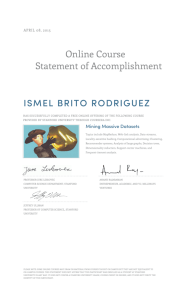Science in Service to Education
advertisement
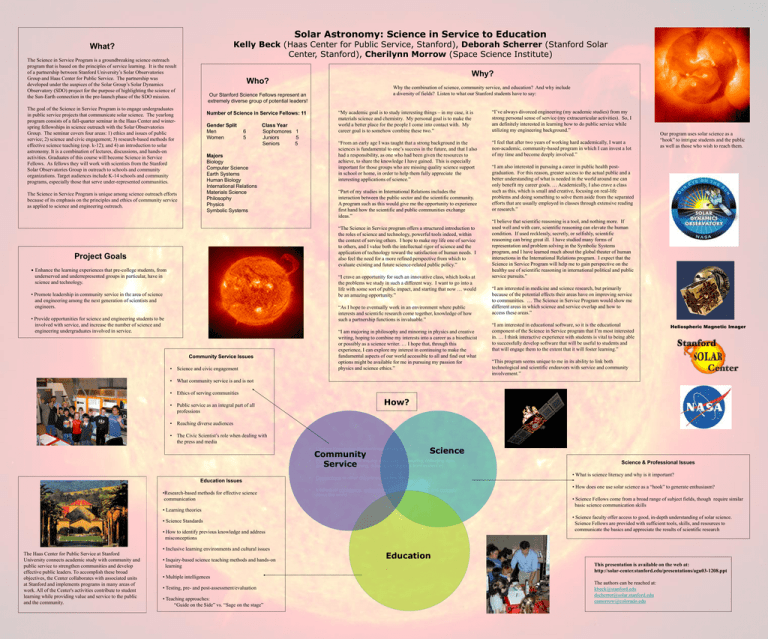
Solar Astronomy: Science in Service to Education Kelly Beck (Haas Center for Public Service, Stanford), Deborah Scherrer (Stanford Solar Center, Stanford), Cherilynn Morrow (Space Science Institute) What? The Science in Service Program is a groundbreaking science outreach program that is based on the principles of service learning. It is the result of a partnership between Stanford University’s Solar Observatories Group and Haas Center for Public Service. The partnership was developed under the auspices of the Solar Group’s Solar Dynamics Observatory (SDO) project for the purpose of highlighting the science of the Sun-Earth connection in the pre-launch phase of the SDO mission. Why? Who? Why the combination of science, community service, and education? And why include a diversity of fields? Listen to what our Stanford students have to say: Our Stanford Science Fellows represent an extremely diverse group of potential leaders! The goal of the Science in Service Program is to engage undergraduates in public service projects that communicate solar science. The yearlong program consists of a fall-quarter seminar in the Haas Center and winterspring fellowships in science outreach with the Solar Observatories Group. The seminar covers four areas: 1) ethics and issues of public service; 2) science and civic engagement; 3) research-based methods for effective science teaching (esp. k-12); and 4) an introduction to solar astronomy. It is a combination of lectures, discussions, and hands-on activities. Graduates of this course will become Science in Service Fellows. As fellows they will work with scientists from the Stanford Solar Observatories Group in outreach to schools and community organizations. Target audiences include K-14 schools and community programs, especially those that serve under-represented communities. Number of Science in Service Fellows: 11 Gender Split Men Women 6 5 Class Year Sophomores 1 Juniors 5 Seniors 5 Majors Biology Computer Science Earth Systems Human Biology International Relations Materials Science Philosophy Physics Symbolic Systems The Science in Service Program is unique among science outreach efforts because of its emphasis on the principles and ethics of community service as applied to science and engineering outreach. “My academic goal is to study interesting things – in my case, it is materials science and chemistry. My personal goal is to make the world a better place for the people I come into contact with. My career goal is to somehow combine these two.” “I’ve always divorced engineering (my academic studies) from my strong personal sense of service (my extracurricular activities). So, I am definitely interested in learning how to do public service while utilizing my engineering background.” “From an early age I was taught that a strong background in the sciences is fundamental to one’s success in the future, and that I also had a responsibility, as one who had been given the resources to achieve, to share the knowledge I have gained. This is especially important for those groups who are missing quality science support in school or home, in order to help them fully appreciate the interesting applications of science.” “I feel that after two years of working hard academically, I want a non-academic, community-based program in which I can invest a lot of my time and become deeply involved.” “Part of my studies in International Relations includes the interaction between the public sector and the scientific community. A program such as this would give me the opportunity to experience first hand how the scientific and public communities exchange ideas.” “The Science in Service program offers a structured introduction to the roles of science and technology, powerful tools indeed, within the context of serving others. I hope to make my life one of service to others, and I value both the intellectual rigor of science and the application of technology toward the satisfaction of human needs. I also feel the need for a more refined perspective from which to evaluate existing and future science-related public policy.” Project Goals • Enhance the learning experiences that pre-college students, from “I crave an opportunity for such an innovative class, which looks at the problems we study in such a different way. I want to go into a life with some sort of public impact, and starting that now … would be an amazing opportunity.” underserved and underrepresented groups in particular, have in science and technology. • Promote leadership in community service in the area of science and engineering among the next generation of scientists and engineers. “As I hope to eventually work in an environment where public interests and scientific research come together, knowledge of how such a partnership functions is invaluable.” • Provide opportunities for science and engineering students to be involved with service, and increase the number of science and engineering undergraduates involved in service. “I am majoring in philosophy and minoring in physics and creative writing, hoping to combine my interests into a career as a bioethicist or possibly as a science writer. … I hope that, through this experience, I can explore my interest in continuing to make the fundamental aspects of our world accessible to all and find out what options might be available for me in pursuing my passion for physics and science ethics.” Community Service Issues • Science and civic engagement Our program uses solar science as a “hook” to intrigue students and the public as well as those who wish to reach them. “I am also interested in pursuing a career in public health postgraduation. For this reason, greater access to the actual public and a better understanding of what is needed in the world around me can only benefit my career goals. … Academically, I also crave a class such as this, which is small and creative, focusing on real-life problems and doing something to solve them aside from the separated efforts that are usually employed in classes through extensive reading or research.” “I believe that scientific reasoning is a tool, and nothing more. If used well and with care, scientific reasoning can elevate the human condition. If used recklessly, secretly, or selfishly, scientific reasoning can bring great ill. I have studied many forms of representation and problem solving in the Symbolic Systems program, and I have learned much about the global theater of human interactions in the International Relations program. I expect that the Science in Service Program will help me to gain perspective on the healthy use of scientific reasoning in international political and public service pursuits.” “I am interested in medicine and science research, but primarily because of the potential effects their areas have on improving service to communities. … The Science in Service Program would show me different areas in which science and service overlap and how to access these areas.” “I am interested in educational software, so it is the educational component of the Science in Service program that I’m most interested in. … I think interactive experience with students is vital to being able to successfully develop software that will be useful to students and that will engage them to the extent that it will foster learning.” Heliospheric Magnetic Imager “This program seems unique to me in its ability to link both technological and scientific endeavors with service and community involvement.” • What community service is and is not • Ethics of serving communities How? • Public service as an integral part of all professions • Reaching diverse audiences • The Civic Scientist’s role when dealing with the press and media • • Education Issues •Research-based methods for effective science communication Science Community Process Skills [skills of inquiry: observing, measuring, collecting data, Service analyzing data, reasoning, drawing conclusions from evidence] Content Knowledge [fundamental concepts] • Connections to other disciplines, society, life • Intellectual confidence, enthusiasm for life-long learning, and curiosity about the world. • Learning theories • How to identify previous knowledge and address misconceptions The Haas Center for Public Service at Stanford University connects academic study with community and public service to strengthen communities and develop effective public leaders. To accomplish these broad objectives, the Center collaborates with associated units at Stanford and implements programs in many areas of work. All of the Center's activities contribute to student learning while providing value and service to the public and the community. • Inquiry-based science teaching methods and hands-on learning • What is science literacy and why is it important? • How does one use solar science as a “hook” to generate enthusiasm? • Science Fellows come from a broad range of subject fields, though require similar basic science communication skills • Science faculty offer access to good, in-depth understanding of solar science. Science Fellows are provided with sufficient tools, skills, and resources to communicate the basics and appreciate the results of scientific research • Science Standards • Inclusive learning environments and cultural issues Science & Professional Issues Education This presentation is available on the web at: http://solar-center.stanford.edu/presentations/agu03-1208.ppt • Multiple intelligences • Testing, pre- and post-assessment/evaluation • Teaching approaches: “Guide on the Side” vs. “Sage on the stage” The authors can be reached at: kbeck@stanford.edu dscherrer@solar.stanford.edu camorrow@colorado.edu
